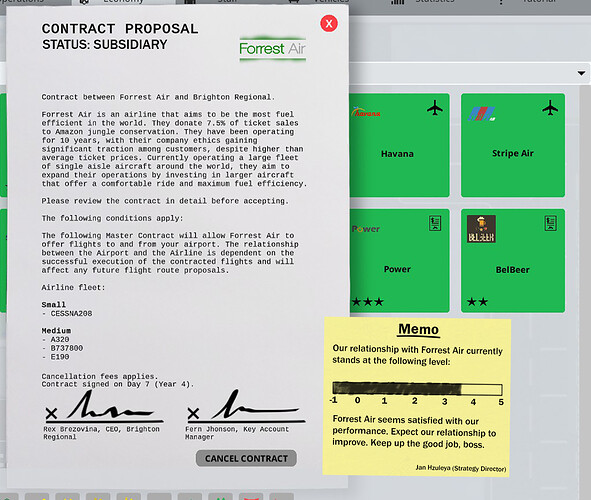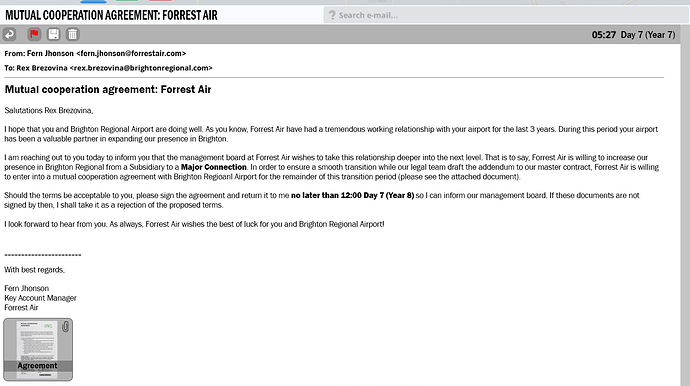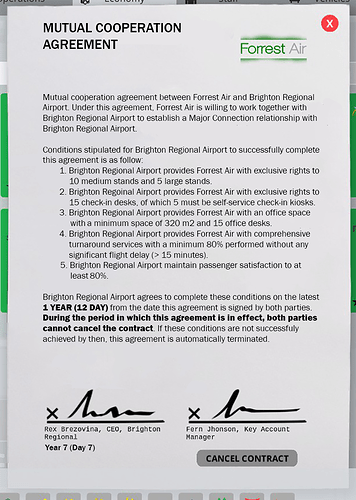Description:
Lately there have been some new implemented features and upcoming + requested features that can expand an airline’s potential commercial relationships with players. It can’t be denied that the current contract system already works, especially for the flight management aspect, however I feel that this system could be expanded even further particularly with the new features that have been released thus far. Thus, I propose the following Airline Contracts 2.5 to expand on the current system with the following pitch: master contract is just the start of a hopefully long lasting commercial relationship.
In a master contract, the airline and the airport management board now have a relationship meter (see Exhibit 1). When the airport first signs the master contract with the airline, the airline and the airport starts at Level 0 relationship. In a Level 0 relationship, airlines only expect slots to be allocated to them. A majority of the flights offered to the airport are one-time flights, with few regular flights and very rarely a contract for services with the airline’s larger planes (e.g. if the airlines have a DHC and a A320, 90-95% of the contracts are for DHCs; if the airlines have a A320 and a A350, 90-95% of the contracts are for A320). This reflects the airlines’ weariness in operating out of your airport, with whom they have never worked out of.
How do you improve your relationship then?
Simple. Airline Satisfaction will slowly increase the relationship over time. Of course it follows from having an efficient operation while providing comprehensive service, and it provides another reason for why you might want to choose that one R&D Program. The more satisfied airlines are with your airport, the faster relationship build over time. Of course, the opposite goes: dissatisfied airlines will start losing relationship with you.
So what if airlines hate me?
Then they will cancel the master contract, and it’ll take a long time for them to start offering a contract again (at least 1Y). This is why signing contracts and adhering to them will be the utmost importance. And more importantly, a cancelled contract wouldn’t reset your relationship, but take it to the previous relationship level. Thus, an airline would only cancel the contract from their side when the relationship hits rock bottom at Level 0, and upon signing a new contract with airport management, their relationship starts at Level -1 and not Level 0. Meanwhile, if airport management (for some reason) cancels a contract with an airlines at Level 3 relationship, then a new contract with this airlines would set the relationship at Level 2 instead of Level 3 or Level -1.
So I just need to service flights? That’s easy!
Or so you think. Once airport management improves relationship with an airline above the cap (e.g. from Level 0 to Level 1), then the airline would start demanding more concrete services. For example, to maintain Level 1 relationship, airline now demands access to at least Jet A1 fueling services, de-icing, etc. In the highest relationship (Level 5), these demands can be quite extensive: minimum numbers of check-in desks (X number of manned desks, self-check in desks+baggage drop), space for ticket sales or airline offices, airline turnaround completed with 95% punctuality, pax satisfaction requirements, special fees or prices for turnaround services, etc. Failure to maintain these conditions would reduce the airline relationship.
Why should I cave into these (obviously crazy) demands from airlines?
There are many reasons for that. The first and most obvious ones is that airlines are willing to offer much more volume. As your relationship with airlines deepen, they will offer new flights at a much higher rate. The mix of these flights would also be more lucrative; much more mix for larger aircrafts (e.g. from 90:10 small:medium at Level 0, to 10:50:30 at Level 3, and finally to 0:30:60 at Level 5) and many being regular flights rather than one-time flights. This could also be expanded further with a minimum, since relationships work both ways: airlines will offer always have a minimum number of flights maintained at the airport (e.g. a airline with Level 3 relationship would maintain 30 flights minimum; a Level 5 relationship meanwhile means a 50 flights minimum)(and if the player closes a stand which cancels all flight, the Airline would almost instantly offer as many flights as necessary to reach the minimum flights as demanded in the contract). Airport management is also able to offer more slots in a week to airlines, from the cap of 50 up to 250/350.
Another more indirect reason is that higher relationships means the airport management will have the opportunity to provide much more ample opportunities to make money off these airlines. For example, at Level 2 relationships, airlines are willing to pay for dedicated check-in desks and dedicated stands. At Level 3 relationships, airlines are willing to lease space for ticket sales as well as offices. At Level 4 relationships, airlines are willing to lease space for exclusive lounge, dedicated hangars, etc. Finally, at Level 5, airlines are willing to offer “Hub” contract for airport management.
What is this about “Hub” contract?
This is essentially the same with what others have suggested in the past. What 2 cents I can add to this discussion is to make the creation of a “Hub” a two-step process, which involves sub-contracts (I’ll explain below what it is). Suffice to say, airline will give a lump-sum payment to airport management to finance the required expansion to turn their airport into a true “Hub” for this airline, as well as a huge chunk of daily income in return for a very extensive and high quality service demanded by the airline. To make it balanced, perhaps Level 5 is limited to just 1 airline/airport.
But how do I know what my relationship level is, and whether I level up?
Don’t worry, under this proposed system, airlines can’t force you to move to the next level of relationship without your consent (it is a relationship after all, not a hostage situation ![]() ). You can always review your current relationship level in your master contract, and with the right board members you can even view your relationship as a progress bar!
). You can always review your current relationship level in your master contract, and with the right board members you can even view your relationship as a progress bar!
Once the airport management and the airlines reach the milestone to advance to their next level of relationship, the airlines would send an e-mail to the CEO wanting to take the co-operation deeper (see Exhibit 2). The airline would then send a “Mutual Cooperation Agreement” (see Exhibit 3). If you’ve ever played Prison Architect, think of these agreements as the “Grants”; i.e. missions for the airport management to complete. The agreement mostly covers required aspects / services that airlines expect the airport provides at the next relationship level. Upon the completion of a cooperation agreement, the airline would send a new sub-contract solidifying the conditions in the cooperation agreement (as a form of addendum/extension to the master contract)(see Exhibit 4). Signing these sub-contract would usher in the new relationship status between the airport management and the airlines. Thus, using the hub contracts for example, under the mutual agreement, airline would send a giant lump sum of money to the airport in order to finance the completion of this agreement (e.g. having the required numbers of stands, etc.), while the signing of the sub-contract will give the airport the daily payments for the hub status.
Keep in mind the CEO can always reject this cooperation agreement with the airlines, with no penalty to relationship (should they believe that this agreement is nothing but a farce).
But what if I failed an agreement, or completed an agreement without wanting to sign sub-contracts?
Not to worry. If you fail the missions, the airlines would only take a small relationship hit. It is after all, not a legally binding contract, just an agreement to align both parties’ needs together. Once your relationship hits that milestone again, the airlines would send you that cooperation agreement. On the other hand, if you completed an agreement but not willing to sign a sub-contract, then there will be no relationship penalties. You just don’t get access to the benefits unlocked on the next relationship level.
Are we done here? This is already getting too long.
Almost. The proposed relationship status (open to suggestion and modifications) are as follows:
-1 : Untrusted → {airline} has an unfavorable opinion of your airport, and there are even persistent rumors that management at {airline} are thinking of cutting ties with your airport.
0: Ambivalent → {airline} are not familiar with your airport and so they are reluctant to work with you airport, but they are willing to try a few flights out of your airport.
1: Familiar → {airline} have established a good working relationship with your airport. {airline} are willing to fly more from your airport.
2: Trusted → Through good service, your airport has established a stellar reputation with {airline}. There are even talks that {airline} is willing to establish a more permanent presence in your airport.
3: Subsidiary → {airline} believes that your airport is important enough for {airline} to establish a sales and administrative presence.
4: Major Connection → {airline} regard your airport as a major node for their network, so much so that they have expanded their presence in your airport.
5: Hub → {airline} regard your airport as a critical part of their flight network; a substantial amount of their flights originated from your airport. Not many airport can boast about being a hub for a major airline, but at least your airport can take pride in being a major hub for {airline}.
TL;DR: Creating a relationship system for airline contracts (with the addition of a grant system from Prison Architect), with added demands from airlines but provide more opportunities to make money from airlines than just servicing flights.
Why it should be implemented:
I believe that having a relationship system would:
- Provide a better progression for the airline management aspects. At the moment, certain airlines are not willing to offer contracts if they don’t have the required service/stands. The tutorial only says that having these expansions is necessary without detailing why. Thus, with the addition of the cooperation agreements and sub-contracts, there will be a feeling of natural progression particularly for ideas suggested by the community (e.g. ticket sales, administrative office, lounges, hubs, etc.)
- Provide more challenge but benefits for CEOs. I applaud the current focus in fleshing out airline satisfaction. However, I believe the system could be make more challenging for CEOs and provide a much more tangible impact than just number of flights offered. Under this proposal, particularly to advance in higher levels, CEOs would be challenged, usually from the expansion mindset that usually dominates early-stage tycoons, to also improve the management mindset in making things run effectively.
Why it should not be implemented:
Reasons to vote against this proposal, which I can think of (so appears to also be neutral/logical/pragmatic in my proposal) are:
- The adoption of this proposal can act as a gatekeeper preventing less skilled players from utilizing features of this game. For example, if a CEO is not able to advance relationship status with an airline, then the CEO might not be able to play with lounges, administrative offices, sales office, etc. This is particularly detrimental for a tycoon game which usually is made quite accessible (as the quote implies, “[…] since this game ultimately is a tycoon game and not a simulator.”)
- Might require new and extensive coding + rework for a small improvement.
Images, references or additional content:
Exhibit 1. Fully analysed relationship meter provided by strategy director, with relationship level listed on the contract.
=
Exhibit 2. E-mail from Airlines inviting CEO for a mutual cooperation agreement
=
Exhibit 3. Example of a mutual cooperation agreement
(will add/edit later)
Disclaimer
Many of these ideas are not mine (e.g. ticket sales, airport hub, administrative offices, etc.), credits due to the community for contributing them. My idea is just how to integrate them into a more natural progression. This proposal is open to further discussion and engagements. Sorry for the blog post, here’s a ![]() .
.




